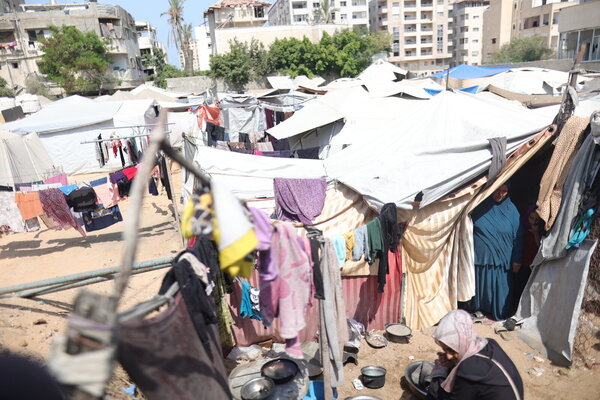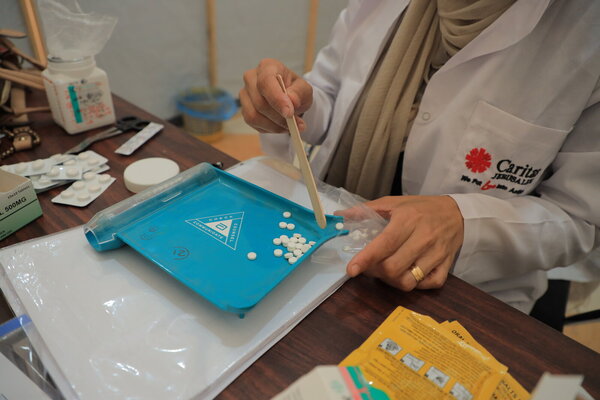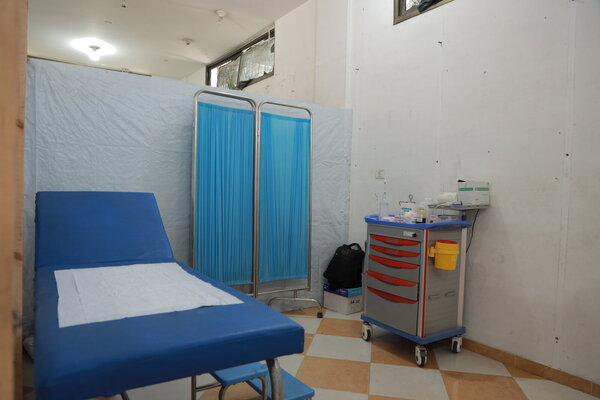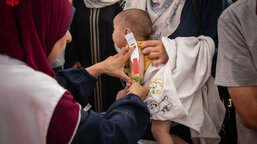The exhibition Gaza Beyond the Headlines offers viewers a glimpse into the lives of local people – clients of a clinic that is a joint project of Caritas Czech Republic, Caritas Jerusalem, and the local organisation Sawa. The project is co-financed by the Ministry of Foreign Affairs of the Czech Republic. The intimate photographs of those who were willing to share their experiences were taken in August of this year. Although their situation was already extremely dire at that time, it has deteriorated further in the weeks since. Due to the rapidly worsening security situation and increasing attacks in the area, the clinic's operations have had to be suspended, and a new location is being sought where its activities may be resumed.
More detailed stories, not only of those whose photographs appear on the exhibition panels, but also of other residents of Gaza who have received assistance from the clinic and agreed to share their stories, can be found on the website of Caritas Czech Republic.
The photographer worked under challenging conditions and, for security reasons, is identified only by his first name.
On the advice of several fellow photographers, I do not disclose my full name or personal photograph due to the current security situation in the Gaza Strip,
explains local photographer Rami. Each story is based on informed consent and respect for the dignity of the individuals portrayed. As confirmed by Ola, the case management coordinator at Caritas Czech Republic: “The people depicted in the photographs have no objections to the use of their real names in the exhibition materials.” These are therefore authentic testimonies and real names, not illustrative images or generalised stories with fictional identities.
The very title of the exhibition, Gaza Beyond the Headlines, refers to the fact that the everyday reality of individuals often disappears beneath layers of fast-paced, dramatic news. Headlines attract attention, but rarely convey the complexity of human life. This project invites a more thorough perspective, slower reading, and deeper reflection – aspects that brief news reports rarely allow. We do not seek to shock or overwhelm with images of suffering; rather, we aim to look beyond the surface, with humility and respect, in accordance with the values of Caritas´s work – assistance without discrimination, with an emphasis on safety, dignity, and specific support.
The photographs and accompanying stories are connected with very specific forms of assistance. In Gaza, with financial support from the Ministry of Foreign Affairs of the Czech Republic, we support our partner clinic operated by Caritas Jerusalem. Under extraordinarily difficult conditions, the clinic provides primary health care to both children and adults – from basic examinations and treatment of chronic illnesses to specialist referrals and medication distribution. The broader project also includes psychosocial support and protection for vulnerable individuals: a crisis hotline offers safe guidance and psychological support, while case management addresses the individual needs of persons and families. Behind each photograph lies a concrete service with real impact – a doctor’s visit, a package of medicines, an hour with a therapist, or secured accommodation for those who have lost their homes.
This is a travelling exhibition, and during October and November it will be displayed at several prominent public locations in Prague:
- From 6 to 15 October in the Wallenstein Garden (Opening hours: Monday-Friday 9:00 – 19:00, Saturday-Sunday 9:00 – 19:00)
- From 15 to 29 October on the street Na Příkopě
- From 29 October to 12 November on Kampa Island
Additionally, it will be installed throughout October in the Church of St. Cajetan in Malá Strana (Archdiocesan Caritas Prague), and from 6 October to 10 November at Radio Proglas in Brno (Olomoucká 7).
If the exhibition resonates with you, we would be deeply grateful for supporting the Caritas´s work in Gaza – even a small donation can provide medicines for another week, another medical examination, or another hour of psychological support. In doing so, you give meaning to the photographs: they transform back into tangible help for those who need it most right now. Thank you for looking closely and with respect.
We extend our heartfelt thanks not only to photographer Rami for his powerful images, but also to our colleagues at Caritas Jerusalem. Without them, the realisation of this exhibition would have been entirely impossible. We also wish to express our gratitude to our partner organisation Sawa, which operates a 24/7 remote counselling and crisis hotline, offering not only psychological support but also basic medical consultations and safe referrals to verified sources of assistance. The expertise of its operators and therapists – from medical advice to anxiety management and coping with despair – provides vital support to people in Gaza during moments when they are cut off from services and information. Finally, we would like to thank the Ministry of Foreign Affairs of the Czech Republic, which co-finances the entire project.
Photographer Rami (*1982) was born in Gaza, where he continues to live and work. He is active in both humanitarian work and media. Since 2014, he has been documenting the lives, resilience, and suffering of Palestinian communities, particularly during times of conflict and forced displacement. His visual approach is rooted in dignity, empathy, and advocacy for the most vulnerable.














